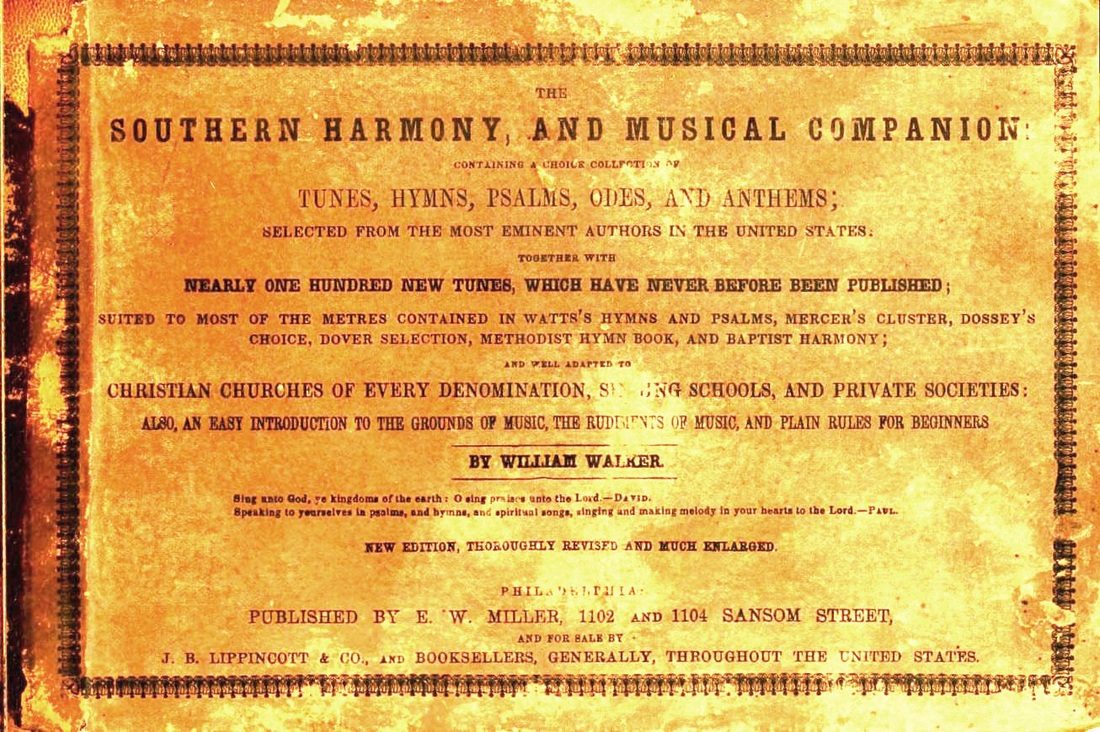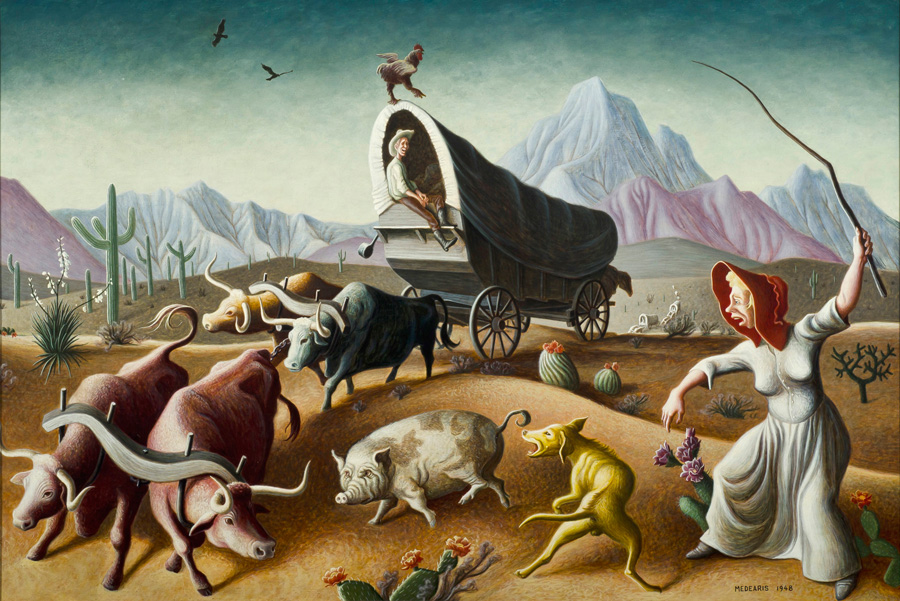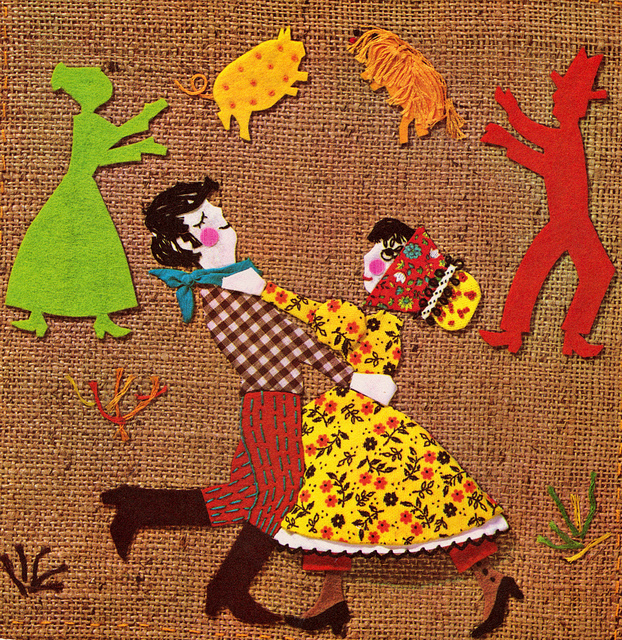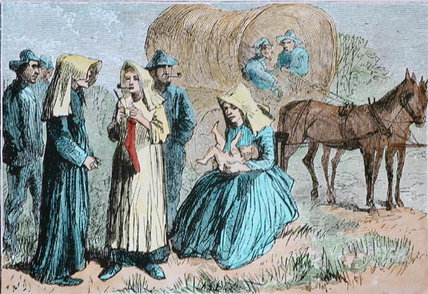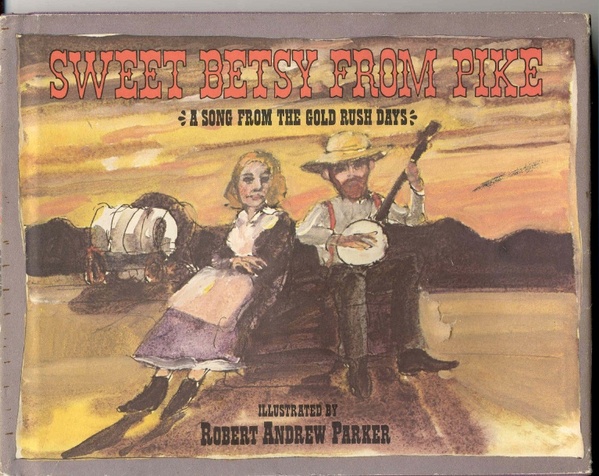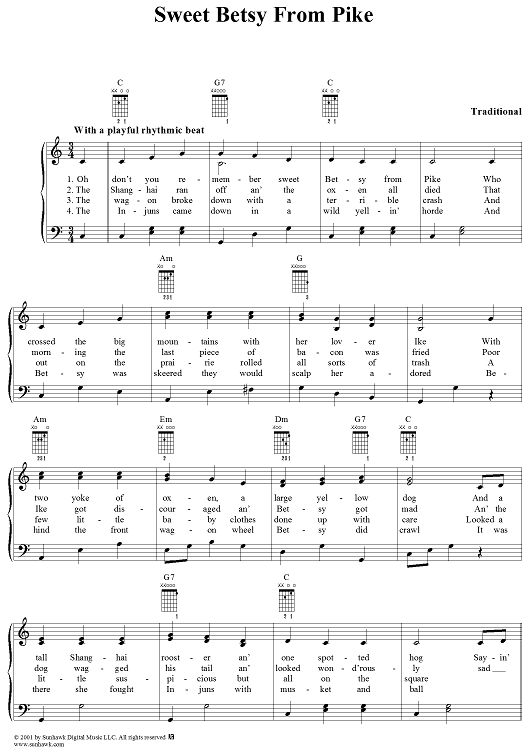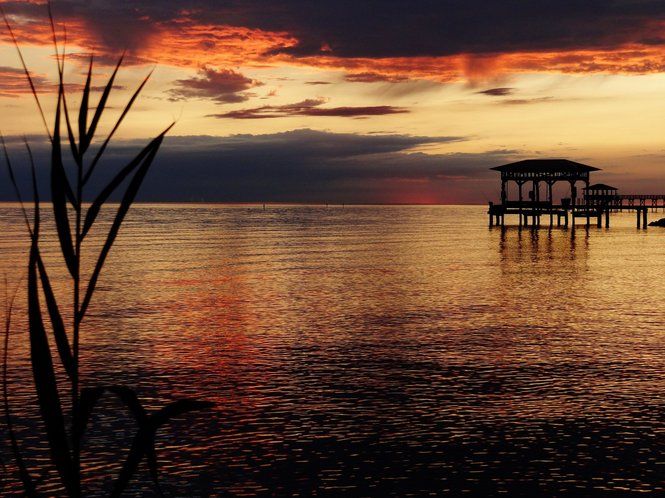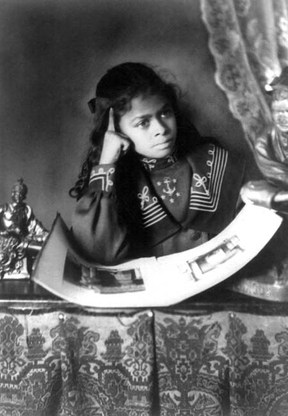Folk and Gospel Music
In today's terminology, there is no clear border between the two forms. To express this problem, we use the term 'crossover.' Indeed many country-western and folk musicians perform and record both forms without any conflict. This why they are on the same page.
|
There are endless variations of the song inspired by the California Gold Rush of 1949. The lyrics are as close as I can find to original publication but the song is fluid in verse and order of verses, with new verses added. Other stanzas not presented include Betsy's encounter with Mormon leader Brigham Young and the death of her infant on the trail. Note again the impact of the Frontier.
Sweet Betsy from Pike American Traditional (1858) Attributed to John A. Stone Version 1: Did you ever hear tell of Sweet Betsy from Pike, Who crossed the wide mountains (blue ridges) with her lover Ike, Two yoke of cattle, a large yeller dog, A tall Shanghai rooster, and a one-spotted hog. Singing too-ra-li-oo-ra-li-oo-ra-li-ay One evening quite early they camped on the Platte, Twas near by the road on a green shady flat. Betsy, sore-footed, lay down to repose-- With wonder Ike gazed on that Pike County rose. Singing too-ra-li-oo-ra-li-oo-ra-li-ay Out on the prairie one bright, starry night, They broke out the whiskey, and Betsy got tight. She sang and she shouted and danced o'er the plain, And she showed her bare arse to the whole wagon train. Singing too-ra-li-oo-ra-li-oo-ra-li-ay A miner said, "Betsy, will you dance with me?" "I will that, old hoss, if you don't make too free. Don't dance me hard, do you want to know why? Doggone you, I'm chock-full of strong alkali." Singing too-ra-li-oo-ra-li-oo-ra-li-ay The Shanghai ran off, and the cattle all died, That morning the last piece of bacon was fried. "Dear old Pike County, I'll go back to you"-- Says Betsy, "You'll go by yourself if you do!" Singing too-ra-li-oo-ra-li-oo-ra-li-ay The Injuns came down in a thundering horde, And Betsy was scared they would scalp her adored. So under the wagon-bed Betsy did crawl And she fought off the Injuns with musket and ball. Singing too-ra-li-oo-ra-li-oo-ra-li-ay They swam the wide rivers and crossed the tall peaks, And camped on the desert for weeks upon weeks. Starvation and cholera, hard work and slaughter-- They reached California 'spite of hell and high water. Singing too-ra-li-oo-ra-li-oo-ra-li-ay Singing too-ra-li-oo-ra-li-oo-ra-li-a Courtesy of the The Smithsonian Institute Version 2: Oh, do you remember Sweet Betsey from Pike Who crossed the wide prairie with her lover Ike? With two yoke of oxen, a big yellow dog, A tall Shanghai rooster, and one spotted hog. Hoodle dang, fol-de-dye do, hoodle dang, fol-de day. Out on the prairie one bright starry night, They broke out the whisky and Betsey got tight; She sang and she shouted and danced o'er the plain, And and showed her bare arse to the whole wagon train. Hoodle dang, fol-de-dye do, hoodle dang, fol-de day. The Injuns came down in a wild yelling horde, And Betsey was skeered they would scalp her adored; Behind the front wagon wheel Betsey did crawl, And fought off the Injuns with musket and ball. Hoodle dang, fol-de-dye do, hoodle dang, fol-de day. They soon reached the desert, where Betsey gave out, And down in the sand she lay rolling about; While Ike in great terror looked on in surprise, Saying, "Get up now, Betsey, you'll get sand in your eyes." Hoodle dang, fol-de-dye do, hoodle dang, fol-de day. The wagon tipped over with a terrible crash, And out on the prairie rolled all sorts of trash; A few little baby clothes done up with care Looked rather suspicious - though 'twas all on the square. Hoodle dang, fol-de-dye do, hoodle dang, fol-de day. The Shanghai ran off and the cattle all died, The last piece of bacon that morning was fried; Poor Ike got discouraged, and Betsy got mad, The dog wagged his tail and looked wonderfully sad. Hoodle dang, fol-de-dye do, hoodle dang, fol-de day. They swam the wide rivers and cross the tall peaks, And camped on the prairie for weeks upon weeks, Starvation and cholera and hard work and slaughter, They reached California spite of hell and high water. Hoodle dang, fol-de-dye do, hoodle dang, fol-de day. Long Ike and sweet Betsey attended a dance, Where Ike wore a pair of his Pike County pants; Sweet Betsey was covered with ribbons and rings. Said Ike, "You're an angel, but where are your wings?" Hoodle dang, fol-de-dye do, hoodle dang, fol-de day. A miner said, "Betsey, will you dance with me?" "I will that, old hoss, if you don't make too free; But don't dance me hard. Do you want to know why? Doggone you, I'm chock full of strong alkali." Hoodle dang, fol-de-dye do, hoodle dang, fol-de day. Long Ike, and sweet Betsey got married of course, But Ike, getting jealous, obtained a divorce; And Betsey, well satisfied, said with a shout, "Good-by, you big lummux, I'm glad you backed out." Hoodle dang, fol-de-dye do, hoodle dang, fol-de day From The American Songbook, 1881. The Lakes of Pontchartrain
Traditional (Melody 1815; Lyrics 1850-1866) It was one fine March morning, I bid New Orleans Adieu And I took the road to Jackson Town, my fortune to renew I cursed all foreign money, no credit could I gain which filled my heart with a longing for the Lakes of Ponchartrain I stepped on board of a railroad car beneath the morning sun I rode the rods till evening and I laid me down again All strangers there no friends to me 'til a dark girl towards me came And I fell in love with the Creole Girl, by the Lakes of Ponchartrain I said "My pretty Creole Girl, me money here's no good, If it weren't for the alligators, I'd sleep out there in the wood" "You're welcome here kind stranger, from such sad thoughts refrain" "For me Mammy welcomes strangers, by the Lakes of Ponchartrain" She took me into her mammy's house and treated me right well The hair upon her shoulders in jet black ringlets fell To try and paint her beauty, I'm sure 'twould be in vain So handsome was my Creole girl by the Lakes of Ponchartrain I asked her if she'd marry me, she said that ne'er could be For she had got a lover and he was far at sea She said that she would wait for him and true she would remain Till he'd return to his Creole girl, on the Lakes of Ponchartrain It's fare thee well, me Creole girl, I'll never see you more I'll never forget your kindness in the cottage by the shore And at each social gathering, a flowing bowl I'll drain And I'll drink a health to my Creole girl, by the Lakes of Ponchartrain From The American Songbook, 1881. This American song has migrated back across the Big Pond, where it has become a standard song in Irish folk music. |
John Newton, born in England, was a captain of a slave trader. After a conversion to Christianity, became Pastor of an Anglican church in Buckinghamshire and an ardent Abolitionist. The melody of "Amazing Grace" is home grown. It was during the Civil War that "Amazing Grace" began to appear as the military hymn. It was also during the time of the Trail of those who Cried that it became the anthem of the Cherokees. The rendition above was recorded after and used for many funerals following the 9/11 attacks. Despite the British origins of the lyrics, "Amazing Grace" is the closest thing to a national hymn America possesses.
Amazing Grace John Newton (1725-1807) Sung to "New Britain," composer unknown, from Appalachia region, USA. Best known version was first published in William Walker's The Southern Harmony. Amazing Grace, how sweet the sound, That saved a wretch like me. I once was lost but now am found, Was blind, but now I see. T'was Grace that taught my heart to fear. And Grace, my fears relieved. How precious did that Grace appear The hour I first believed. Through many dangers, toils and snares I have already come; 'Tis Grace that brought me safe thus far and Grace will lead me home. The Lord has promised good to me. His word my hope secures. He will my shield and portion be, As long as life endures. Yea, when this flesh and heart shall fail, And mortal life shall cease, I shall possess within the veil, A life of joy and peace. When we've been here ten thousand years Bright shining as the sun. We've no less days to sing God's praise Than when we've first begun. Amazing Grace, how sweet the sound, That saved a wretch like me. I once was lost but now am found, Was blind, but now I see. Sources include: Hymnary.org, Constitution.org, Methodist Hymnal (1967 ed.), & PBS.org Video clip used under Fair Use law
|
